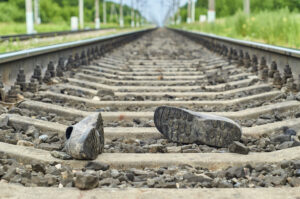One of the first columns I wrote for The Pipeline almost three years ago employed the metaphor of the irresistible force meeting the immovable object to forecast the likely consequences of Green politics. The irresistible force was the imposition of a policy of Net-Zero carbon emissions upon the populations of the West, in particular those of Anglosphere, and the immovable object was the democratic electorates of these countries.
It might take time, I argued, but when the voters found that Green Deals and such meant higher energy prices, higher taxes, immiseration of the less well-off, and harshly puritan lifestyles for the rest of us, an almighty smash-up would ensue.
And so it has. Indeed, the smash-up has come sooner than I expected, namely this year, and it will almost certainly be harsher because the negative impact of Net-Zero has been aggravated by the Russo-Ukraine war and sanctions adopted by the U.S. and the E.U. in response to it.

To stop train, pull handle. But think first.
What I didn’t expect, however, is that the smash-up would take place in slow-motion. But that is what’s happening.
Almost wherever you look, there’s some not-very-important story that tips you off to a subterranean explosion whose full impact won’t be properly felt for a while. The effect is something like the delayed impact of depth charges or deadpan jokes.
Here, for instance, is the London Daily Telegraph telling us that the Brits will be wearing new styles of underwear this winter—and not because they’re hoping for a more exotic sex-life:
Households are stockpiling thermal underwear to avoid turning on the heating this winter as energy bills spiral. John Lewis, Britain’s biggest department store chain, said shoppers had rushed to buy warmer clothes in recent weeks, with sales of winter thermals having doubled last week compared to a week earlier. Sales of dressing gowns are up 76pc compared to last year.
That’s the precautionary principle reduced to the bare essentials. Like everyone else in the northern hemisphere, ordinary Brits are expecting a chilly winter this year because of the following factors (which didn't start with Mr. Putin’s war); Like most Western governments, the U.K. powers-that-be have neglected to invest enough in energy security because they quite consciously preferred to invest in transitioning from fossil fuels to renewable forms of energy. That is the orthodoxy of Net-Zero (sometimes enforced by treaties) in E.U. countries such as Germany, non-E.U. countries like Britain, and the U.S.
It’s a massive enterprise because until recently fossil fuels provided more than 85 percent of total energy to even the most technically advanced economies. In pursuit of this vision of a future of all-renewable energy, Germany has shut down almost all its nuclear power stations, keeps equivocating over whether the shut down the few remaining ones, and ends up relying on “dirty coal” now that cheap Russian energy is as unreliable as "renewables."

California, dreaming...
Over the Pond the Biden administration has been refusing to license oil-and-gas explorations on federal land with the embarrassing result that it has to import oil from Venezuela. And the U.K. government too has banned “fracking” that would exploit the nation's plentiful reserves of natural gas. As a result almost all of these countries are facing the risk of energy shortfalls to the point at which energy “blackouts” and rationing are seriously entertained by utilities and regulators if the winter is severe. California too.
Moreover, the costs of transitioning to renewables are not only high, they are rising. The International Energy Agency has just revised its estimate of the investment needed to limit global temperatures to meet the Net-Zero target under the Paris Accords upwards. That will now rise from the 390 billion dollars annually today to 1.3 trillion dollars a year between now and 2030. If met, those targets would eliminate emissions from the energy sector by 2035 in the advanced world and by 2040 in developing countries. But they are unlikely to be met. On present trends Net-Zero won’t be achieved until 2060—and present trends look too optimistic in the light of the present energy crisis.
The upshot of which is that almost all the West’s governments face slightly different versions of two serious problems: uncertain energy supplies, and existing high indebtedness.
Take energy supplies first. Germany is facing a serious crisis of its fundamental economic model in the post-Ukraine world, Its two foundations were exporting cars to China and importing cheap energy from Russia. For the foreseeable future, neither now looks like a reliable prospect or even a possible one. Berlin must now struggle to replace the Russian energy half-forbidden by the sanctions it supports diplomatically.

Artifacts of an ancient civilization, if Greens get their way.
Similarly, because Britain neglected nuclear investment—its target of 25 percent of energy from nuclear power stations will be reached in 2050!—the country is heavily dependent on imported natural gas which it needs to solve the renewables’ “intermittency problem”: there are days when the wind doesn’t blow nor the sun shine. As Andrew Stuttaford points out, that makes the earlier decision of the U.K. government to close down its biggest natural gas storage capacity an especially shortsighted one. Even the French, who sensibly went nuclear in a big way in the 1970s, now have to spend on repairs and modernization.
What of the second aspect of the crisis: overspending? Two sorts of spending need to be financed here—that for Net-Zero, and that to finance the energy security national governments have neglected. Unfortunately, however necessary they are, they come on top of the massive sums of money that the same governments have already spent during the Covid-19 pandemic on locking down their economies and paying their people to stay at home. That backlog of indebtedness explains why the financial markets are becoming nervous of lending money to governments that don’t make financial responsibility their top priority. Interest rates are rising again in response to rising inflation, and that's a problem for governments that want to borrow money.
We saw that very recently when the British government fell because the markets thought it was adopting a cavalier attitude to debt. That impression was both exaggerated--the U.K.’s national debt as a percentage of GDP is one of the lowest in Europe--and largely the result of rash but trivial political misjudgments by ex-Prime Minister Liz Truss and her Chancellor Kwasi Kwarteng. All the same, the market brought them down because they were planning to add to an already high total of government spending.

Long johns, here we come.
When that happens, every spending program becomes the enemy of every other program. If restoring energy security becomes a priority for governments, then spending on Net-Zero will—and should—come under pressure. After all, Britain's short financial crisis became a political one in part because it was leading to a rise in mortgage payments. Like rising sales of warm thermal underwear, rising mortgage payments are another symptom of the price that the Brits will be paying for ill-judged energy policies. Voters' shoes are beginning to pinch; the immovable object is beginning to stiffen.
Of course, the irresistible force (in the form of support for Net-Zero from an alliance of the establishment and radical Green anarchists) has neither vanished nor much diminished. At almost every stage it has objected to policies that looked likely to prioritize energy security over the transition to renewables. With the arrival of a new prime minister, Rishi Sunak, it has been flexing its muscles to warn him that it will tolerate no lifting of the ban on fracking that the doomed Liz Truss tried to bring about. Net-Zero is an obstruction to restoring the energy security that it undermined in the first place. The circle closes.
My impression is that Sunak is taking his time to assess what Leonid Brezhnev used to call “the correlation of forces.” On the one hand, he has said that he will keep the ban on fracking unless evidence appears that suggests it is not dangerous to the environment; on the other, he has decided not to attend the U.N.’s COP 27 Climate Summit on the grounds that, in effect, he’s got more important things to do in London. My translation: he doesn’t want to attend and be trapped into making commitments on Net-Zero that might later be inconvenient to his overall energy and budgetary policies.
He may also think that Winter when the snow falls and Britain’s bedrooms freeze will be time also when the irresistible force of Net-Zero becomes much less irresistible and the immovable object of voter resistance much more resistant. And irremovable.
Article tags: Bank of England, E.U., Energy, environmentalism, Germany, green energy, net-zero, Oil and Gas, Rishi Sunak, Russia, U.K., ukraine
There is another irresistable force that most Liliputians forget about. They do so mainly because they haven't seen it for such a long time. Here in the U.S., they have awoken the sleeping giant.
If people are cold, and they see their children are cold, their elderly parents and grandparents are cold, or dying, because they are cold, is when patience will run out.
Then the elites had better be living on mountaintops together.
Some in my Community still burn wood to heat their homes
Whatsa problem? Fahrenheit is 451 degrees.
==============